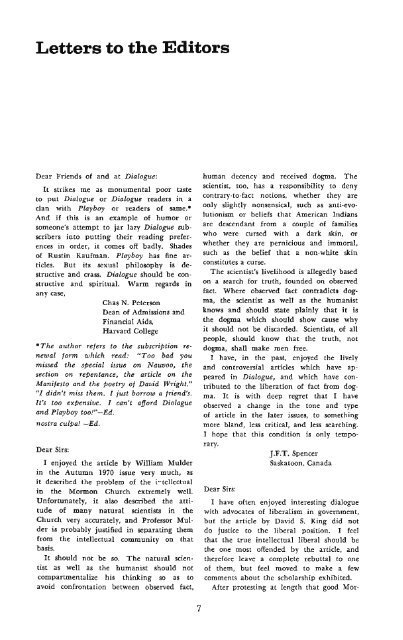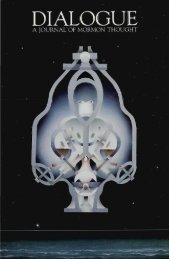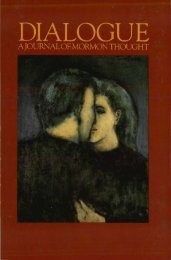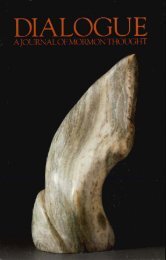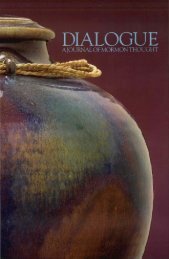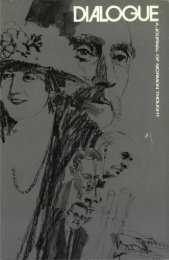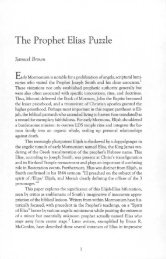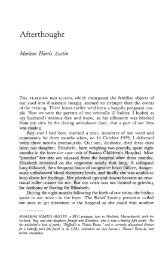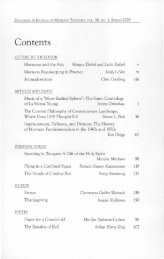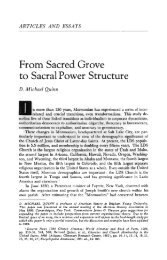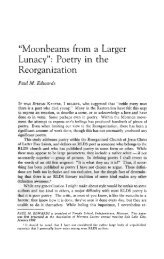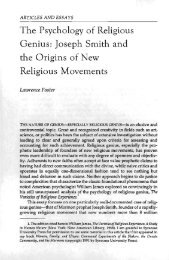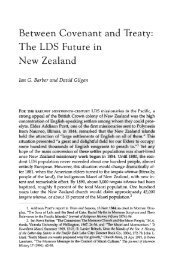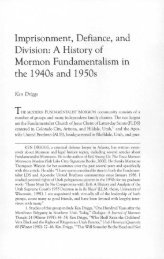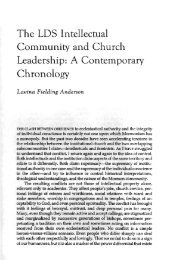Letters to the Editors - Dialogue – A Journal of Mormon Thought
Letters to the Editors - Dialogue – A Journal of Mormon Thought
Letters to the Editors - Dialogue – A Journal of Mormon Thought
You also want an ePaper? Increase the reach of your titles
YUMPU automatically turns print PDFs into web optimized ePapers that Google loves.
<strong>Letters</strong> <strong>to</strong> <strong>the</strong> Edi<strong>to</strong>rs<br />
Dear Friends <strong>of</strong> and at <strong>Dialogue</strong>:<br />
It strikes me as monumental poor taste<br />
<strong>to</strong> put <strong>Dialogue</strong> or <strong>Dialogue</strong> readers in a<br />
clan with Playboy or readers <strong>of</strong> same.*<br />
And if this is an example <strong>of</strong> humor or<br />
someone's attempt <strong>to</strong> jar lazy <strong>Dialogue</strong> subscribers<br />
in<strong>to</strong> putting <strong>the</strong>ir reading preferences<br />
in order, it comes <strong>of</strong>f badly. Shades<br />
<strong>of</strong> Rustin Kaufman. Playboy has fine articles.<br />
But its sexual philosophy is destructive<br />
and crass. <strong>Dialogue</strong> should be constructive<br />
and spiritual. Warm regards in<br />
any case,<br />
Chas N. Peterson<br />
Dean <strong>of</strong> Admissions and<br />
Financial Aids,<br />
Harvard College<br />
*The author refers <strong>to</strong> <strong>the</strong> subscription renewal<br />
form which read: "Too bad you<br />
missed <strong>the</strong> special issue on Nauvoo, <strong>the</strong><br />
section on repentance, <strong>the</strong> article on <strong>the</strong><br />
Manifes<strong>to</strong> and <strong>the</strong> poetry <strong>of</strong> David Wright."<br />
"I didn't miss <strong>the</strong>m. I just borrow a friend's.<br />
It's <strong>to</strong>o expensive. I can't afford Diolague<br />
and Playboy <strong>to</strong>o!"—Ed.<br />
nostra culpa! —Ed.<br />
Dear Sirs:<br />
I enjoyed <strong>the</strong> article by William Mulder<br />
in <strong>the</strong> Autumn 1970 issue very much, as<br />
it described <strong>the</strong> problem <strong>of</strong> <strong>the</strong> intellectual<br />
in <strong>the</strong> <strong>Mormon</strong> Church extremely well.<br />
Unfortunately, it also described <strong>the</strong> attitude<br />
<strong>of</strong> many natural scientists in <strong>the</strong><br />
Church very accurately, and Pr<strong>of</strong>essor Mulder<br />
is probably justified in separating <strong>the</strong>m<br />
from <strong>the</strong> intellectual community on that<br />
basis.<br />
It should not be so. The natural scientist<br />
as well as <strong>the</strong> humanist should not<br />
compartmentalize his thinking so as <strong>to</strong><br />
avoid confrontation between observed fact,<br />
human decency and received dogma. The<br />
scientist, <strong>to</strong>o, has a responsibility <strong>to</strong> deny<br />
contrary-<strong>to</strong>-fact notions, whe<strong>the</strong>r <strong>the</strong>y are<br />
only slightly nonsensical, such as anti-evolutionism<br />
or beliefs that American Indians<br />
are descendant from a couple <strong>of</strong> families<br />
who were cursed with a dark skin, or<br />
whe<strong>the</strong>r <strong>the</strong>y are pernicious and immoral,<br />
such as <strong>the</strong> belief that a non-white skin<br />
constitutes a curse.<br />
The scientist's livelihood is allegedly based<br />
on a search for truth, founded on observed<br />
fact. Where observed fact contradicts dogma,<br />
<strong>the</strong> scientist as well as <strong>the</strong> humanist<br />
knows and should state plainly that it is<br />
<strong>the</strong> dogma which should show cause why<br />
it should not be discarded. Scientists, <strong>of</strong> all<br />
people, should know that <strong>the</strong> truth, not<br />
dogma, shall make men free.<br />
I have, in <strong>the</strong> past, enjoyed <strong>the</strong> lively<br />
and controversial articles which have appeared<br />
in <strong>Dialogue</strong>, and which have contributed<br />
<strong>to</strong> <strong>the</strong> liberation <strong>of</strong> fact from dogma.<br />
It is with deep regret that I have<br />
observed a change in <strong>the</strong> <strong>to</strong>ne and type<br />
<strong>of</strong> article in <strong>the</strong> later issues, <strong>to</strong> something<br />
more bland, less critical, and less searching.<br />
I hope that this condition is only temporary.<br />
J.F.T. Spencer<br />
Saska<strong>to</strong>on, Canada<br />
Dear Sirs:<br />
I have <strong>of</strong>ten enjoyed interesting dialogue<br />
with advocates <strong>of</strong> liberalism in government,<br />
but <strong>the</strong> article by David S. King did not<br />
do justice <strong>to</strong> <strong>the</strong> liberal position. I feel<br />
that <strong>the</strong> true intellectual liberal should be<br />
<strong>the</strong> one most <strong>of</strong>fended by <strong>the</strong> article, and<br />
<strong>the</strong>refore leave a complete rebuttal <strong>to</strong> one<br />
<strong>of</strong> <strong>the</strong>m, but feel moved <strong>to</strong> make a few<br />
comments about <strong>the</strong> scholarship exhibited.<br />
After protesting at length that good Mor-
mons ought <strong>to</strong> "check <strong>the</strong>ir politics at <strong>the</strong><br />
door" before <strong>the</strong>y enter a church <strong>to</strong> worship,<br />
Mr. King proceeds <strong>to</strong> attempt support<br />
for liberalism in government by, among<br />
o<strong>the</strong>r things, quoting scriptures and leaning<br />
on "good Christian principles." He never<br />
addresses himself at all <strong>to</strong> <strong>the</strong> fundamental<br />
question <strong>of</strong> where <strong>the</strong> liberals presume <strong>to</strong><br />
have <strong>the</strong> right (perhaps from God?) <strong>to</strong> expropriate<br />
<strong>the</strong> earnings <strong>of</strong> anyone o<strong>the</strong>r than<br />
<strong>the</strong>mselves for any cause whatever beyond<br />
protection <strong>of</strong> an individual's freedom and<br />
property. To teach me <strong>to</strong> be a better<br />
Christian <strong>to</strong>ward my brethren in need is one<br />
ideal (<strong>the</strong> one chosen by Christ), but <strong>to</strong><br />
simply steal <strong>the</strong> fruits <strong>of</strong> my labor for<br />
purposes which someone else holds <strong>to</strong> be<br />
virtuous is quite ano<strong>the</strong>r concept — though<br />
Mr. King apparently makes no differentiation.<br />
Robin Hood's use <strong>of</strong> <strong>the</strong> plunder he<br />
s<strong>to</strong>le did not reduce his crime. I could<br />
just as well suggest that we ought <strong>to</strong> take<br />
Mr. King's income for my personal needs,<br />
since he lives better than I, and even if<br />
I should have a majority vote in my favor<br />
<strong>to</strong> do just that, it would still not be morally<br />
right (though it would perhaps be<br />
"twentieth century" liberal morality).<br />
Mr. King's writing techniques are certainly<br />
not in keeping with <strong>the</strong> usual quality<br />
<strong>of</strong> <strong>Dialogue</strong>, for <strong>the</strong>y include such things<br />
as irresponsible anti-logic ("It seems <strong>to</strong> me<br />
that <strong>the</strong> only persons entitled <strong>to</strong> protest<br />
<strong>the</strong>se [liberal] governmental programs would<br />
be those pitifully few who receive no benefits<br />
from <strong>the</strong>m at all."), name calling<br />
("Many ultraconservatives appear <strong>to</strong> have<br />
finally reached a compromise with <strong>the</strong> twentieth<br />
century .. ."), fear <strong>of</strong> popular disfavor<br />
("This entirely false image [<strong>of</strong> Congressmen<br />
<strong>to</strong>ward <strong>the</strong> Church] was bound <strong>to</strong> impede<br />
<strong>the</strong> progress <strong>of</strong> <strong>the</strong> Church .. ." [!]),<br />
and quoting out <strong>of</strong> context (see his use<br />
<strong>of</strong> D&C 134:9).<br />
In short, I was exceedingly disappointed<br />
that <strong>Dialogue</strong> would print such a poor<br />
rendition <strong>of</strong> <strong>the</strong> liberal political position.<br />
Is it because <strong>of</strong> Mr. King's name only? It<br />
is obviously not because he has <strong>the</strong> scholarly<br />
qualities <strong>of</strong> sound reasoning and intellect<br />
one ought <strong>to</strong> be able <strong>to</strong> expect in<br />
a magazine <strong>of</strong> this calibre. In <strong>the</strong> future<br />
I would suggest articles <strong>of</strong> this scholarship<br />
and ability be relegated <strong>to</strong> Ladies Home<br />
<strong>Journal</strong>, and that <strong>the</strong> edi<strong>to</strong>rs <strong>of</strong> <strong>Dialogue</strong><br />
concentrate on articles by perhaps lesserknown<br />
authors, but ones whose scholarship<br />
is equal <strong>to</strong> <strong>the</strong> ideals <strong>of</strong> <strong>the</strong> magazine.<br />
Or do we have <strong>to</strong> look forward <strong>to</strong> future<br />
articles like "Ecology and Environment" by<br />
Ladybird Johnson, and "The Political<br />
Foundations <strong>of</strong> Democracy" by Benjamin<br />
Spock?<br />
E. Ray Martin<br />
Los Alamos, New Mexico<br />
David S. King replies:<br />
Mr. Martin's contribution highlights my<br />
previous conclusion that trying <strong>to</strong> reach a<br />
concensus on how <strong>to</strong> use political agencies<br />
for humane purposes is an exercise in <strong>to</strong>tal<br />
futility.<br />
Of his several statements, largely ad<br />
hominem, only one, in my opinion, deserves<br />
comment. Mr. Martin finds it singular that,<br />
having first requested Latter-day Saints <strong>to</strong><br />
check <strong>the</strong>ir politics at <strong>the</strong> meeting house<br />
door, I should <strong>the</strong>n attempt <strong>to</strong> give doctrinal<br />
support <strong>to</strong> my own political views.<br />
I am surprised that Mr. Martin failed<br />
<strong>to</strong> grasp <strong>the</strong> distinction between personal<br />
opinion and <strong>of</strong>ficial attribution. The citations<br />
in <strong>the</strong> original article from <strong>the</strong> Prophet<br />
Joseph Smith and from <strong>the</strong> First Presidency<br />
show an unmistakable awareness <strong>of</strong><br />
this distinction. It is because <strong>of</strong> it, and<br />
only because <strong>of</strong> it, that <strong>the</strong> doctrine <strong>of</strong><br />
<strong>the</strong> separation <strong>of</strong> Church and State can accommodate<br />
itself <strong>to</strong> <strong>the</strong> demands <strong>of</strong> individual<br />
freedom <strong>of</strong> speech.<br />
For a Latter-day Saint, acting in his individual<br />
capacity, <strong>to</strong> invoke <strong>Mormon</strong> doctrine<br />
<strong>to</strong> support his own political views,<br />
is one thing; but for him <strong>to</strong> falsely ascribe<br />
<strong>to</strong> his personal political views <strong>the</strong> <strong>of</strong>ficial<br />
sanction <strong>of</strong> <strong>the</strong> Church, is quite ano<strong>the</strong>r.<br />
It is <strong>the</strong> latter, and only <strong>the</strong> latter, <strong>to</strong> which<br />
I <strong>to</strong>ok exception.
Consistent with <strong>the</strong> above, a member<br />
would have <strong>the</strong> <strong>the</strong>oretical right <strong>to</strong> express<br />
controversial political views, even within<br />
<strong>the</strong> chapel precincts, if <strong>the</strong> circumstances<br />
made it clear that he was speaking un<strong>of</strong>ficially,<br />
and without attribution. However,<br />
in my opinion even this practice would be<br />
censurable for reasons <strong>of</strong> poor taste. Latterday<br />
Saints attend church <strong>to</strong> worship, and <strong>the</strong><br />
spirit <strong>of</strong> worship is <strong>the</strong> spirit <strong>of</strong> unity. There<br />
are many satisfac<strong>to</strong>ry media, including <strong>Dialogue</strong>,<br />
through which Latter-day Saints can<br />
more properly express <strong>the</strong>ir personal political<br />
differences.<br />
Dear Sirs:<br />
I find it remarkable that Stephen Taggart's<br />
essay <strong>Mormon</strong>ism's Negro Policy:<br />
Social and His<strong>to</strong>rical Origins (U. <strong>of</strong> Utah<br />
Press, 1969), should have called forth such<br />
a verbal flood as Lester Bush's "Commentary"<br />
(<strong>Dialogue</strong>, Vol. IV, No. 4). "Remarkable"<br />
it is, <strong>to</strong> me at least, that <strong>the</strong> <strong>the</strong>sis<br />
<strong>of</strong> his<strong>to</strong>rical-circumstantial origin <strong>of</strong> <strong>the</strong><br />
Negro policy would inspire such a monumental<br />
research effort as Mr. Bush has put<br />
forth. Many, if not most, <strong>of</strong> us who have<br />
concerned ourselves with this policy over<br />
<strong>the</strong> past two decades, and openly voiced<br />
our dissent with it, have simply assumed<br />
this <strong>the</strong>sis without any serious attempt <strong>to</strong><br />
document it. It seemed self-evident. But<br />
<strong>the</strong> late lamented Stephen Taggart made<br />
<strong>the</strong> effort, and in my view, <strong>the</strong> effort is<br />
quite adequate.<br />
One may ask, "What o<strong>the</strong>r explanations<br />
are <strong>the</strong>re?" The scriptural evidence does<br />
not exist. Bush himself notes that " A careful<br />
reading <strong>of</strong> <strong>the</strong> <strong>Mormon</strong> Scriptures reveals<br />
a most confused picture . . ." Also,<br />
in what may be called a considerable understatement,<br />
he fur<strong>the</strong>r notes, "The question<br />
<strong>of</strong> <strong>the</strong> his<strong>to</strong>ricity <strong>of</strong> <strong>the</strong> Books <strong>of</strong><br />
Abraham and Moses needs fur<strong>the</strong>r analysis<br />
especially as it concerns <strong>the</strong> Negro and <strong>the</strong><br />
priesthood." Of course where <strong>the</strong> Scripture<br />
is inadequate <strong>to</strong> validate <strong>the</strong> policy, mythology<br />
can be supplied as a substitute. So,<br />
<strong>the</strong> Negro "sat on <strong>the</strong> fence," etc. The<br />
Biblical accounts <strong>of</strong> sundry "curses" say<br />
nothing <strong>of</strong> black skin.<br />
Moreover, <strong>the</strong> policy is morally incongruous<br />
with basic <strong>Mormon</strong> as well as<br />
Christian ethics. How, in <strong>the</strong> light <strong>of</strong> <strong>the</strong><br />
accepted principle <strong>of</strong> <strong>the</strong> Fa<strong>the</strong>rhood <strong>of</strong><br />
God <strong>of</strong> all men, can one justify singling<br />
out a specific race as under a "divine curse?"<br />
I venture <strong>to</strong> say that had <strong>the</strong> Church originated<br />
in Scandinavia or some o<strong>the</strong>r country<br />
devoid <strong>of</strong> Negroes — even o<strong>the</strong>r countries<br />
<strong>of</strong> Europe — no such policy would<br />
have been thought <strong>of</strong>. But <strong>the</strong> Church<br />
originated in America; slavery was here; <strong>the</strong><br />
slaves were black. The policy <strong>of</strong> priesthood<br />
denial is based on racism which assigns<br />
<strong>to</strong> ano<strong>the</strong>r race a position <strong>of</strong> inferiority.<br />
It is this presumed inferiority which inspired<br />
<strong>the</strong> prejudices among <strong>Mormon</strong>s as<br />
well as o<strong>the</strong>r "white and delightsome"<br />
people. It is <strong>the</strong>se prejudices in which <strong>the</strong><br />
policy is imbedded. How can it be denied?<br />
I am not sure just what purpose Mr. Bush<br />
had in mind in his "Commentary." It seems<br />
<strong>to</strong> accept <strong>the</strong> general <strong>the</strong>sis, but feels Taggart<br />
didn't do as good a job as he could<br />
have done. The young scholar is not here <strong>to</strong><br />
defend his work, but I am sure that, like<br />
any scholar, he would be glad for <strong>the</strong> relevant<br />
references supplied in various places<br />
by Mr. Bush. But <strong>the</strong>se seem <strong>to</strong> supplement<br />
and certainly, in my view, do not<br />
vitiate <strong>the</strong> basic argument.<br />
Mr. Bush doubts that <strong>the</strong> policy originated<br />
with Joseph Smith; ra<strong>the</strong>r that it<br />
came with successors, especially Brigham<br />
Young. This is a minor point since <strong>the</strong>se<br />
men had <strong>the</strong>ir prejudices formed, not in<br />
Utah, but in New England, Ohio, Illinois,<br />
and especially Missouri. They were not<br />
socio-psychological creatures <strong>of</strong> <strong>the</strong> Great<br />
Salt Lake Valley.<br />
Of course, nothing is going <strong>to</strong> be settled<br />
on <strong>the</strong> issue. The "will <strong>to</strong> believe" is a<br />
bulwark against attitudinal change. The<br />
tendency is <strong>to</strong> defend what is. The Thomists<br />
will prevail until someone in authority<br />
with sufficient moral courage will correct<br />
<strong>the</strong> evil.<br />
Lowry Nelson<br />
Coral Gables, Florida<br />
Dear Sirs:<br />
I just received <strong>the</strong> Summer 1970 issue <strong>of</strong><br />
<strong>Dialogue</strong>. I found <strong>the</strong> articles by Marden<br />
Clark and Edward Hart most interesting,<br />
but wish most <strong>of</strong> all <strong>to</strong> thank you for publishing<br />
David Wright's "The Conscience <strong>of</strong><br />
<strong>the</strong> Village." Have plans been made <strong>to</strong><br />
publish River Saints in full — assuming <strong>the</strong><br />
remainder is as good as this sampling?<br />
Thanks for your efforts <strong>to</strong>wards helping<br />
make our secular life relevant <strong>to</strong> our religion<br />
— and not <strong>the</strong> reverse.<br />
Robert J. Christensen<br />
Taipei, Taiwan
Dear Sirs:<br />
I am gratified <strong>to</strong> learn that my friend<br />
Dr. Carl J. Christensen (<strong>Dialogue</strong>, [Winter<br />
1970] 9) agrees completely with my view<br />
(<strong>Dialogue</strong>, [Spring 1967], 5) <strong>of</strong> <strong>the</strong> eternal<br />
individuality <strong>of</strong> <strong>the</strong> essence or will <strong>of</strong> man,<br />
though he does err in stating that my<br />
quotation, indicating some possible <strong>of</strong>ficial<br />
Church sanction <strong>of</strong> <strong>the</strong> opposite view, was<br />
not in <strong>the</strong> Teachers Supplement <strong>to</strong> <strong>the</strong><br />
Gospel Doctrine Course, The Gospel in <strong>the</strong><br />
Service <strong>of</strong> Man.<br />
The complete objective statement from<br />
p. 6 reads as follows (italics mine):<br />
The elements are eternal. (D&C 93:33).<br />
"All spirit is matter." (D&C 131:7). Spirit<br />
element, called also "intelligence," has always<br />
existed, indeed it "was not created<br />
or made, nei<strong>the</strong>r indeed can be." (D&C<br />
93:29). However, spirit children whose<br />
bodies were made <strong>of</strong> spirit element were<br />
born in pre-existence as <strong>the</strong> <strong>of</strong>fspring <strong>of</strong><br />
God, which is <strong>the</strong> same as saying that<br />
<strong>the</strong> eternal intelligence was organized in<strong>to</strong><br />
"intelligences," in<strong>to</strong> "souls" as "spirits"<br />
(Abraham 3:22, 23). God's plan is <strong>to</strong> enable<br />
His spirit children <strong>to</strong> become like<br />
Him.<br />
Dr. Christensen's "thought" (about a similar<br />
statement elsewhere in <strong>the</strong> supplement)<br />
that his "original statement was adversely<br />
edited by one <strong>of</strong> <strong>the</strong> echelon <strong>of</strong> edi<strong>to</strong>rs who<br />
scrutinized <strong>the</strong> manuscript before it went<br />
<strong>to</strong> press," leads me <strong>to</strong> fear that <strong>the</strong> view<br />
expressed in <strong>the</strong> above excerpt may have<br />
fairly wide currency in <strong>the</strong> Church.<br />
The only scripture we have that explicitly<br />
affirms <strong>the</strong> eternal individuality <strong>of</strong> man and<br />
his eternal likeness <strong>to</strong> or "coequality"<br />
(Joseph Smith's term) with God is Abraham<br />
3:18-19. If we add <strong>to</strong> this remarkable<br />
scripture verses 21 and 22, in which <strong>the</strong><br />
Lord is speaking <strong>of</strong> <strong>the</strong> works <strong>of</strong> His hands,<br />
we see that <strong>the</strong>se individual "spirits" have<br />
been "organized" in<strong>to</strong> intelligences, man's<br />
"first estate" (verses 26 and 28) and subsequently<br />
in<strong>to</strong> men, his "second estate" (Abraham<br />
was one <strong>of</strong> <strong>the</strong>m — verse 23). This<br />
can be unders<strong>to</strong>od only if <strong>the</strong> organizing<br />
<strong>of</strong> "spirits" in<strong>to</strong> "intelligences" is interpreted<br />
as <strong>the</strong> bringing <strong>of</strong> <strong>the</strong> individual<br />
"spirits" in<strong>to</strong> a relationship with matter and<br />
with each o<strong>the</strong>r in <strong>the</strong> same sense that God<br />
created man by bringing his spirit (what<br />
was referred <strong>to</strong> as "intelligence" in Abraham<br />
3:21) in<strong>to</strong> a relationship with <strong>the</strong> physical<br />
matter <strong>of</strong> this earth — "<strong>the</strong> dust <strong>of</strong><br />
<strong>the</strong> ground" — as described in Moses 3:7.<br />
These scriptures dp not lend <strong>the</strong>mselves <strong>to</strong><br />
<strong>the</strong> interpretation quoted above from <strong>the</strong><br />
Teachers Supplement.<br />
Abraham 3:18-28 was likely <strong>the</strong> basis for<br />
Joseph Smith's earth-shaking King Follet<br />
sermon. Here <strong>the</strong> view <strong>of</strong> <strong>the</strong> eternal individuality<br />
<strong>of</strong> man, <strong>to</strong>ge<strong>the</strong>r with his godlike<br />
nature, is fur<strong>the</strong>r developed and this<br />
view has been widely affirmed by presidents<br />
<strong>of</strong> <strong>the</strong> Church since Joseph Smith's time.<br />
This concept gives <strong>Mormon</strong>ism much <strong>of</strong> its<br />
distinctive character. It is <strong>the</strong> basis for <strong>the</strong><br />
concept <strong>of</strong> eternal progression, and without<br />
it <strong>the</strong> idea that man is a child <strong>of</strong> God with<br />
god-like potential would be nonsense.<br />
The <strong>Mormon</strong> concept <strong>of</strong> <strong>the</strong> eternal individuality<br />
<strong>of</strong> man makes man a free moral<br />
agent by necessity and not by choice, ei<strong>the</strong>r<br />
God's or his own. This provides a philosophically<br />
satisfac<strong>to</strong>ry solution <strong>to</strong> man's<br />
most troubling problem — that <strong>of</strong> <strong>the</strong> agony<br />
<strong>of</strong> suffering and pain in <strong>the</strong> earth. The<br />
only o<strong>the</strong>r adequate solution <strong>to</strong> this problem<br />
that I know <strong>of</strong> is Darwin's <strong>the</strong>ory <strong>of</strong> evolution<br />
in which God is remote or nonexistent.<br />
Though this <strong>the</strong>ory is pr<strong>of</strong>oundly<br />
effective in ordering and explaining much<br />
<strong>of</strong> what we observe, it is inadequate <strong>to</strong> my<br />
inmost needs and convictions because it is<br />
incomplete. On <strong>the</strong> o<strong>the</strong>r hand, <strong>the</strong> <strong>Mormon</strong><br />
explanation is deeply satisfying.<br />
I am thoroughly convinced that those<br />
who subscribe <strong>to</strong> <strong>the</strong> view that intelligences<br />
were formed by God from eternal intelligence<br />
or spirit element stray far from <strong>the</strong><br />
truth-<br />
John H. Gardner<br />
Provo, Utah<br />
AS MAN IS<br />
<strong>Mormon</strong> sermons din<br />
On <strong>the</strong> Sabbath shopping sin,<br />
But a Sunday s<strong>to</strong>re<br />
With an open door<br />
The Saints go marching in.<br />
Gwen A. Sandberg<br />
Cedar City, Utah<br />
Dear Sirs:<br />
Help!<br />
I would like <strong>to</strong> establish a dialogue with<br />
members <strong>of</strong> <strong>the</strong> Church who have had experience<br />
with <strong>the</strong> problems <strong>of</strong> <strong>the</strong> emotionally<br />
ill. Specifically <strong>the</strong> neurotic who<br />
is active in <strong>the</strong> Church.<br />
In my case after three years <strong>of</strong> group<br />
<strong>the</strong>rapy and a year <strong>of</strong> individual analysis<br />
with a psychiatrist, <strong>the</strong> symp<strong>to</strong>ms generally<br />
10
are latent but still <strong>the</strong> neurosis is <strong>the</strong>re.<br />
The unhappiness arises due <strong>to</strong> <strong>the</strong> fact that<br />
<strong>the</strong> neurosis manifests itself as behaviour<br />
that is antisocial, hostile, and antagonistic.<br />
Such behaviour is <strong>to</strong>tally unacceptable in a<br />
closely-knit social group such as <strong>the</strong> Church<br />
<strong>of</strong> Jesus Christ <strong>of</strong> Latter-day Saints where<br />
earthly happiness and ultimately eternal<br />
progression is dependent upon harmonious<br />
interpersonal relationships.<br />
To complicate <strong>the</strong> matter, having Church<br />
leaders who for <strong>the</strong> most part are untrained<br />
in working with individuals who are emotionally<br />
unstable it seems that a member<br />
<strong>of</strong> <strong>the</strong> Church who is neurotic finds that<br />
<strong>the</strong>re are very few with his religious background<br />
<strong>to</strong> whom he can go for help. Fur<strong>the</strong>rmore,<br />
fasting and prayer <strong>to</strong> overcome a<br />
personal problem can be a rewarding experience<br />
for some but also can be an outlandish<br />
nightmare fraught with despair,<br />
frustration, and unfathomable guilt for<br />
o<strong>the</strong>rs.<br />
What is <strong>the</strong> hope for <strong>the</strong> neurotic both<br />
now and in <strong>the</strong> hereafter? How can <strong>the</strong><br />
hostile neurotic be active in <strong>the</strong> Church<br />
without alienating <strong>the</strong> members whose love<br />
and friendship he needs so desperately?<br />
How can <strong>the</strong> neurotic work out <strong>the</strong> problems<br />
<strong>of</strong> life and still function in <strong>the</strong> Church,<br />
having <strong>the</strong> confidence <strong>of</strong> <strong>the</strong> leaders who<br />
can call him <strong>to</strong> organizational positions in<br />
order that he can magnify his priesthood<br />
and gain for himself and his family its<br />
blessings?<br />
I feel that <strong>the</strong>se questions are not unique<br />
<strong>to</strong> me but must have been encountered by<br />
many Latter-day Saints both knowing and<br />
unknowing. <strong>Dialogue</strong> presents a forum place<br />
from which experiences can be ga<strong>the</strong>red on<br />
a Church-wide basis which o<strong>the</strong>rwise would<br />
be unavailable. I am hoping that <strong>the</strong>re<br />
will be response <strong>to</strong> this inquiry and that<br />
possibly I can help as well as be helped.<br />
Name withheld<br />
Dear Sirs:<br />
Recognizing a need for dialogue among<br />
L.D.S. visual artists living in California,<br />
a group <strong>of</strong> artists in <strong>the</strong> Los Angeles area<br />
is sponsoring a fine arts exhibit <strong>of</strong> <strong>Mormon</strong><br />
artists <strong>to</strong> be held in April 1972.<br />
Entries are not restricted <strong>to</strong> <strong>Mormon</strong><br />
<strong>the</strong>mes.<br />
Those wishing <strong>to</strong> contribute <strong>the</strong>ir works,<br />
ideas and/or suggestions can contact <strong>the</strong><br />
planning committee at <strong>the</strong> following address:<br />
Sally Rogers<br />
2477 Sawtelle<br />
Los Angeles, Calif. 90064<br />
Dear Edi<strong>to</strong>rs:<br />
One <strong>of</strong> <strong>the</strong> articles in <strong>the</strong> Roundtable<br />
on <strong>the</strong> Coalville Tabernacle predicted that<br />
<strong>the</strong> Ogden Pioneer Tabernacle would be <strong>the</strong><br />
next his<strong>to</strong>ric <strong>Mormon</strong> building <strong>to</strong> fall before<br />
<strong>the</strong> wrecker's ball. This prediction<br />
has proven true; <strong>the</strong> Ogden building has<br />
been demolished.<br />
The old Ogden Tabernacle was <strong>of</strong> less<br />
intrinsic value than <strong>the</strong> Coalville Tabernacle,<br />
but it was a highly distinctive example<br />
<strong>of</strong> pioneer architecture, and as <strong>the</strong><br />
oldest public building in Ogden it had<br />
great his<strong>to</strong>ric value. Even more distressing<br />
than <strong>the</strong> fact that a valuable and irreplaceable<br />
building was destroyed, however,<br />
is <strong>the</strong> disingenuous way <strong>the</strong> matter was<br />
handled by Church <strong>of</strong>ficials. The leadership<br />
at Coalville did at least conform <strong>to</strong> <strong>the</strong><br />
procedural requirements we have come <strong>to</strong><br />
expect in Church government. The same<br />
cannot be said <strong>of</strong> Ogden. Local Church<br />
members were given no opportunity whatsoever<br />
<strong>to</strong> vote or o<strong>the</strong>rwise express <strong>the</strong>ir will<br />
in <strong>the</strong> matter. The decision was made by<br />
<strong>the</strong> stake presidents <strong>of</strong> <strong>the</strong> region at a<br />
closed meeting. After <strong>the</strong> meeting, Church<br />
<strong>of</strong>ficials persistently refused <strong>to</strong> deal candidly<br />
with inquiries as <strong>to</strong> <strong>the</strong>ir plans for<br />
<strong>the</strong> building, and public announcement <strong>of</strong><br />
<strong>the</strong> decision was made only after demolition<br />
was under way. Apparently, <strong>the</strong> principle<br />
<strong>of</strong> common consent is no longer operative<br />
in Church government. The era <strong>of</strong><br />
<strong>the</strong> bulldozer has arrived in more ways<br />
than one.<br />
11
The <strong>of</strong>ficial reason given for tearing down<br />
<strong>the</strong> Ogden Tabernacle was that its design<br />
did not harmonize with that <strong>of</strong> <strong>the</strong> new<br />
temple under construction on <strong>the</strong> same<br />
block. There is no denying <strong>the</strong> truth <strong>of</strong><br />
that statement. The old tabernacle was a<br />
building <strong>of</strong> character and dignity. It looked<br />
like a house <strong>of</strong> worship, whereas <strong>the</strong> new<br />
temple resembles nothing so much as a<br />
giant Hot Shoppes restaurant or a casino<br />
transplanted from <strong>the</strong> Las Vegas strip. With<br />
<strong>the</strong> Church building program in <strong>the</strong> hands<br />
<strong>of</strong> people so imperceptive as <strong>to</strong> admire <strong>the</strong><br />
casino-modern style and <strong>to</strong> reject as <strong>of</strong> no<br />
value <strong>the</strong> Coalville and Ogden Tabernacles,<br />
<strong>the</strong> future <strong>of</strong> his<strong>to</strong>ric <strong>Mormon</strong> buildings<br />
looks very bleak indeed.<br />
Sincerely,<br />
Robert B. Angell<br />
Dear Sirs:<br />
Bro<strong>the</strong>r Kenneth K. Godfrey's essay, "The<br />
Coming <strong>of</strong> <strong>the</strong> Manifes<strong>to</strong>" (Autumn 1970),<br />
was most interesting. Concerning <strong>the</strong> alleged<br />
revelation given <strong>to</strong> John Taylor on<br />
27 September 1886 and <strong>the</strong> comment made<br />
in footnote 10, page 15, that "Dean Jesse<br />
concluded in his study ["A Comparative<br />
Study and Evaluation <strong>of</strong> <strong>the</strong> Latter-day<br />
Saint and <strong>the</strong> Fundamentalist Views Pertaining<br />
<strong>to</strong> <strong>the</strong> Practice <strong>of</strong> Plural Marriage,"<br />
Master's Thesis, Brigham Young University,<br />
1959, p. 101] that it is highly probable<br />
that such a revelation does exist," <strong>the</strong> following<br />
should be noted.<br />
On 17 June 1933, <strong>the</strong> First Presidency<br />
made <strong>the</strong> following statement in a letter<br />
<strong>to</strong> <strong>the</strong> "Presidents <strong>of</strong> Stakes and Counselors":<br />
It is alleged that on September 26-27,<br />
1886, President John Taylor received a<br />
revelation from <strong>the</strong> Lord ... As <strong>to</strong> this<br />
pretended revelation it should be said<br />
that <strong>the</strong> archives <strong>of</strong> <strong>the</strong> Church contain<br />
no such revelation; <strong>the</strong> archives contain<br />
no record <strong>of</strong> any such revelation, nor<br />
any evidence justifying a belief that any<br />
such revelation was ever given. From<br />
<strong>the</strong> personal knowledge <strong>of</strong> some <strong>of</strong> us,<br />
from <strong>the</strong> uniform and common recollection<br />
<strong>of</strong> <strong>the</strong> presiding quorums <strong>of</strong> <strong>the</strong><br />
Church, from <strong>the</strong> absence in <strong>the</strong> Church<br />
archives <strong>of</strong> any evidence whatsoever justifying<br />
any belief that such a revelation<br />
was given, we are justified in affirming<br />
that no such revelation exists.<br />
Fur<strong>the</strong>rmore, so far as <strong>the</strong> authorities<br />
<strong>of</strong> <strong>the</strong> Church are concerned and so far<br />
as <strong>the</strong> members <strong>of</strong> <strong>the</strong> Church are concerned,<br />
since this pretended revelation,<br />
if ever given, was never presented <strong>to</strong> and<br />
adopted by <strong>the</strong> Church or by any council<br />
<strong>of</strong> <strong>the</strong> Church, and since <strong>to</strong> <strong>the</strong> contrary,<br />
and inspired rule <strong>of</strong> action, <strong>the</strong><br />
Manifes<strong>to</strong>, was (subsequently <strong>to</strong> <strong>the</strong> pretended<br />
revelation) presented <strong>to</strong> and<br />
adopted by <strong>the</strong> Church, which inspired<br />
rule in its terms, purport, and effect was<br />
directly opposite <strong>to</strong> <strong>the</strong> interpretation<br />
given <strong>to</strong> <strong>the</strong> pretended revelation, <strong>the</strong><br />
said pretended revelation could have no<br />
validity and no binding effect and force<br />
upon Church members, and action under<br />
it would be unauthorized, illegal, and<br />
void.<br />
Heber J. Grant,<br />
Anthony W. Ivins,<br />
J. Reuben Clark, Jr.,<br />
First Presidency.<br />
(Messages <strong>of</strong> <strong>the</strong> First Presidency, compiled<br />
by Jesse R. Clark, Bookcraft Inc.,<br />
vol. V, p. 327)<br />
Talking <strong>of</strong> <strong>the</strong> supposed two-day committee<br />
meeting <strong>of</strong> President John Taylor,<br />
George Q. Cannon, L. John Nuttal, Samuel<br />
Bateman, Charles W. Wilkins, Charles<br />
Birrell, Daniel R. Bateman, Bishop Samuel<br />
Sedden, George Earl, Lorin Woolley, his<br />
fa<strong>the</strong>r, John W. Woolley, his mo<strong>the</strong>r, Julia<br />
E. Woolley, and his sister, Amy Woolley,<br />
in which <strong>the</strong> alleged revelation was presented,<br />
President Joseph Fielding Smith, in<br />
a letter <strong>to</strong> Walter L. Whipple on 24 April<br />
1956 said:<br />
. . . No such meeting ever <strong>to</strong>ok place.<br />
... I knew President George Q. Cannon,<br />
Samuel Bateman, and Charles W.<br />
Wilkins, and <strong>the</strong>y were true men and<br />
<strong>the</strong>y were true <strong>to</strong> President Wilford<br />
Woodruff, Lorenzo Snow and <strong>to</strong> President<br />
Joseph F. Smith. Lorin Woolley's s<strong>to</strong>ries<br />
are afterthoughts uttered when all <strong>the</strong>se<br />
men are dead and cannot speak for <strong>the</strong>mselves.<br />
In <strong>the</strong> diary <strong>of</strong> Samuel Bateman it states<br />
that he was at <strong>the</strong> Woolley's home at this<br />
time. But was he in council with a prophet<br />
<strong>of</strong> God? No, he says that he was playing<br />
quoits all day on at least one <strong>of</strong> <strong>the</strong>se two<br />
days.<br />
I will let <strong>the</strong> reader draw his own conclusions<br />
whe<strong>the</strong>r or not this meeting ever<br />
<strong>to</strong>ok place or if <strong>the</strong> revelation referred <strong>to</strong><br />
was ever given; personally, from <strong>the</strong> prayerful<br />
study I've done, I don't believe <strong>the</strong>y<br />
did -<br />
E. Jay Bell<br />
Ridgecrest, California<br />
12


